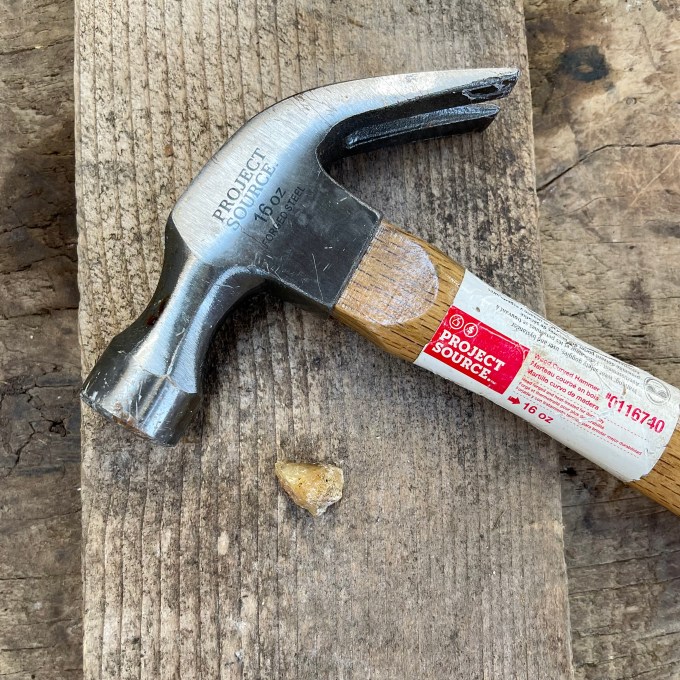Recipe: Alcohol / Resin Wood Hardener
Wood hardener lengthens the life of deadwood. It hardens punky wood in danger of eroding away, and likely protects against decomposition by pathogens.
Store bought wood hardeners can certainly be used. I’ve tried them, and they seem to apply the resin mostly to the outside layer of wood.
I prefer the recipe I learned in Japan as it’s easy to adjust for penetration, and because it’s cheap.
Thanks to a subscriber for suggesting this post!
Here’s how to make the wood hardener that I learned from Mr. Suzuki.

Tree resin, collected at the base of conifer trees. Resin is produced from environmental or insect wounds, like the loss of a branch or a borer hole. Over time the resin hardens and looks like a translucent rock.

Now for the operation: take a hammer and a chunk of hardened resin.

Pound till crushed.

Pour isopropyl alcohol in a jar at a weak dilution, about 1:50, with the crushed resin. Let sit overnight.

Brush onto the deadwood. The thinner you make the dilution, the more it seems to soak into the wood. The isopropyl will evaporate, leaving the resin inside. Apply several coats. If one coat leaves a sheen, consider diluting with more isopropyl.

16 Comments
Interesting. Was unaware that this way of persevering wood. Thank you.
Can this be used with deciduous trees as well such as a hollow ??
Thanks for the question! Yes, I use it on deciduous as well. As a group deciduous deadwood rarely lasts as long as conifer so there’s more of a reason to apply it.
Thank you for this little nugget of information Michael! I have a few questions but may be over thinking things. 1st would how long does it last and I’m guessing applying over cleaned and already lime sulphured deadwood? And 2nd would using hardened resin from same species be more effective? (Pine resin on pine deadwood, spruce to spruce etc?) Would be a fun experiment but those were my initial thoughts after reading. Thank you kindly as always for your tutelage. 🤙🤜🤛
Very interesting questions…thanks! Resin does appear to last for a few years, sort of like oiling siding. Eventually it volatilizes.
Yes, I prefer to clean wood first and apply lime sulfur if desired, as the lime sulfur does allow penetration of resin but not the other way around.
I’m not sure about this last question. I usually seek pine resin in the woods though I don’t have a good reason for doing this. I’ve also used spruce and fir. But which hardens best or lasts longest or whether we should be using only the same resin as the tree…not sure. I think because deciduous wood can be hardened with conifer resin, and because they don’t produce resin themselves, may be an argument to use the best, longest-lasting conifer resin on everything. Whatever that is!
I should mention that if folks don’t have access to woods and resin picked up there you can try rosin for a string instrument bow.
If you’re looking to purchase resin in the US, rather than collecting your own, it is often sold as rosin, not resin. For Amazon, try adding another search term term, like “pine rosin” or “rosin flakes” or “rosin powder”. Otherwise, their algorithms will assume you’re a violinist.
Interesting technique. I’m gonna give this a try. When you say 1:50 dilution, do you mean 50 parts alcohol to 1 part resin, or is the alcohol diluted 1:50 with water?
Michael thanks for the information. Can stone resin be obtained online to buy? I live in Puerto Rico and we have Conocarpus erectus with a lot of dead wood and given the degree of environmental humidity, the wood rots. This would be a good alternative as I use commercial liquid Wood Hardener.
Thanks, Michael. When I read it, I thought about shellac, not as an alternative, but it also lays down a light film during alcohol evaporation.
It wonder if the resin in fat wood, found in most grocery stores, might be a decent source.
Would applying Minwax wood hardener over lime sulphur work as well? I don’t have access to rosin. Thanks.
Yes, Minwax and other commercial brands can work. You may wish to thin with alcohol.
What about olive oil. It leave a nice black colour o the wood
If you wish the wood to get darker, yes, that’s an option. The benefit of the resin hardener is it doesn’t change the color of the wood. So you can apply it over lime sulfur to keep the wood light in color.
Hello Michael, thank you for sharing, can you explain the dilution of 1:50, what is 1 and what is 50? Thank you, Chris
Hi Chris- thanks, I should have clarified: 1 is resin, 50 alcohol. Roughly.
One of your best tips/secrets, I’ve trained my outdoorsy hiking adult children to keep a keen eye out for pitch globs, thanks for the reminder!